Reading time: 25 minutes
(If you missed Part Twelve, click here.)
Matson. What a game…
Steve Floyd
Fed up…
It’s Saturday, April 29, 1978. For Camborne RFC, it’s the day of their final game of the Centenary Season: the fifty-first.
The season has exceeded all expectations: a CRFU Cup and Merit Table ‘double’, the first in the club’s history and achieved in this most auspicious playing year, has given them the undisputed title of the best rugby team in Cornwall.
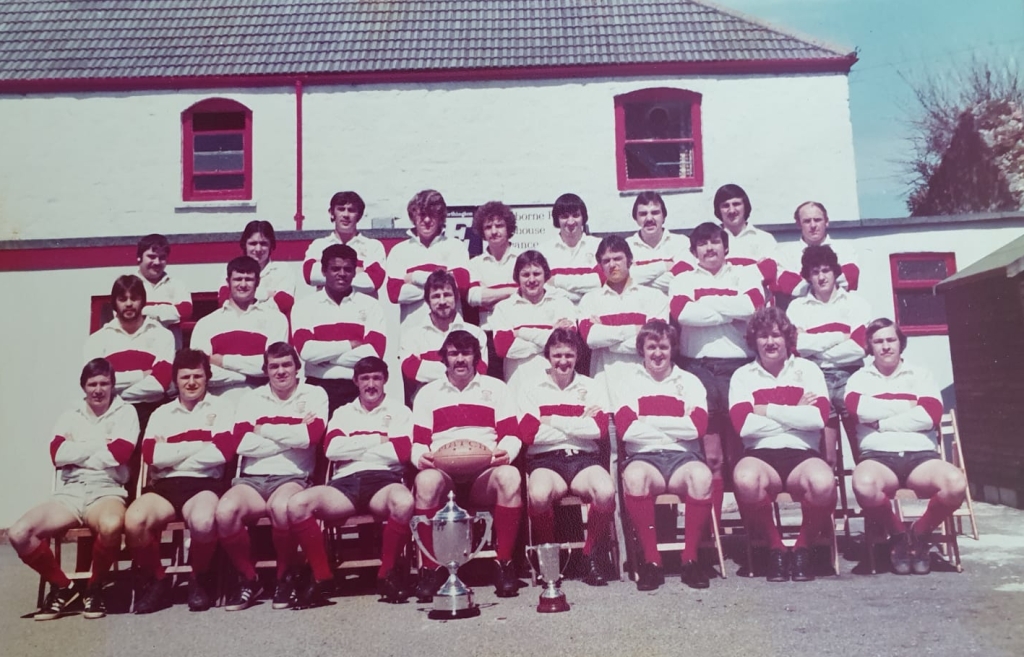
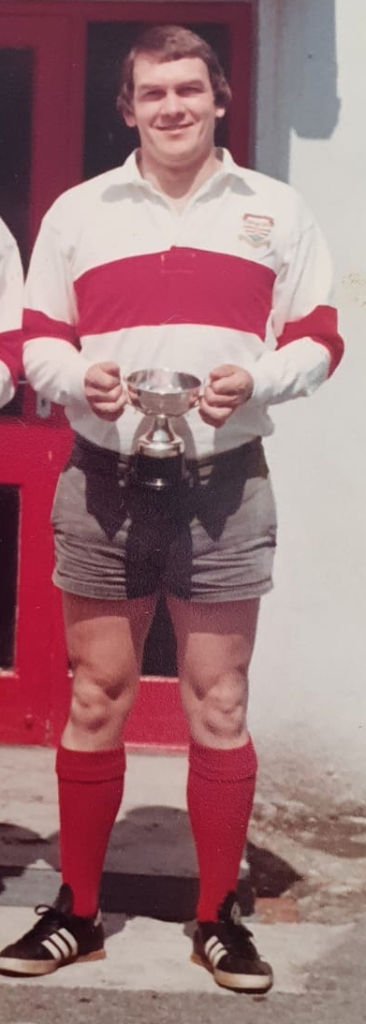
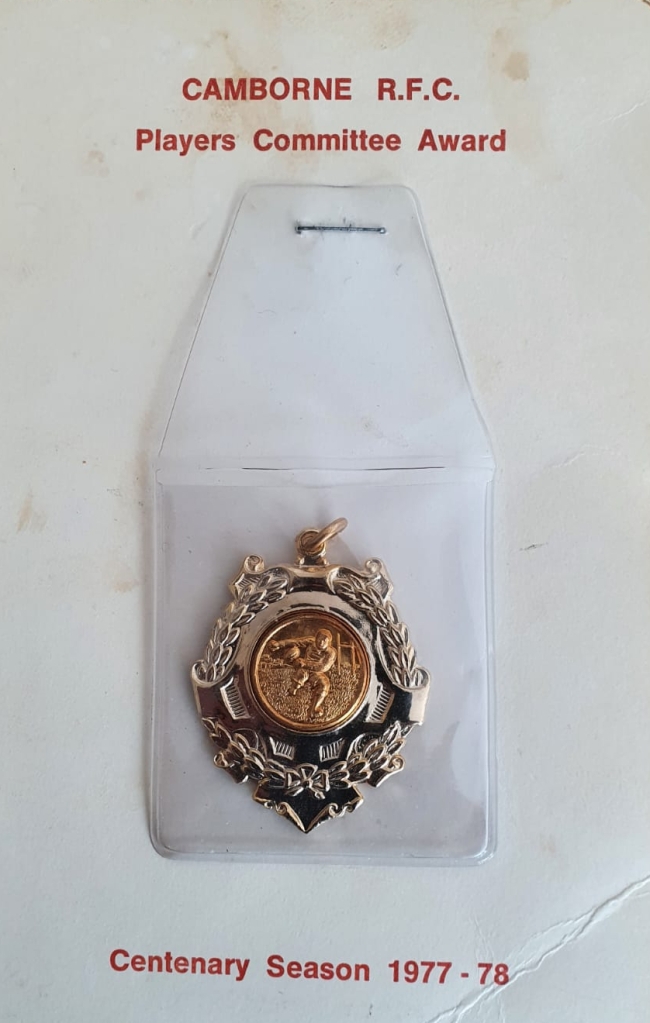
Yet, and maybe understandably, the end cannot come soon enough for some. One player told me that, by as early as Easter, he
…began to get fed up with it…
A season of 35-40 fixtures was the accepted norm. But the prestige of the Centenary Year, combined with the recognition and pressure brought about by their success, meant the season’s duration as originally contrived by Treve Pascoe, (a masterpiece described as “inestimable” by Jerry Clarke1) had begun to feel like a millstone for several of the squad.
Lest we forget, they were all working men: no one was paying them for their services. Most had young families: Chris Durant, Malcolm Bennetts and Nigel Pellowe, to name but three. Coping with home life, work, training, and matches ultimately took its toll. Dave Edwards, for example, missed games – and took days off – as he found night-shifts at Holman’s so gruelling.
Today, Chris Durant simply couldn’t
…believe the amount of games…
when I gave him a fixture list to study. Likewise Malcolm Bennetts:
…how did Camborne get away with playing over 50 matches in a season?…what our wives and families put up with was amazing…
But they were almost done. One game remained, a fixture that had to be honoured as a direct result of Town’s victory in the CRFU Cup.
This was a John Player National Knockout preliminary round fixture at Matson RFC, a club in Gloucester. If they beat Matson, next season Camborne would compete in the competition proper. To win the John Player Cup meant you were the best XV in England.
Yet again, there was a lot to play for. Camborne weren’t just representing themselves any more. They were representing Cornish rugby.
Punishing…
But before they travelled to Gloucestershire, there were yet more matches to play. It wasn’t for nothing that Town’s season at this stage was described as “punishing” in the Press2.
The very day after beating St Austell in the CRFU Cup Final, Thursday April 203, Camborne hosted Porthcawl.
Obviously, this was a very different XV from the one that prevailed over The Saints, but Durant (conversion, two penalties), Richard Thomas (try), and Malcolm Bennetts all took part in a 12-6 victory for Camborne.
Bennetts wanted to play because he was out for revenge. When Town played the Welshmen last season, someone had thrown dust in his eyes at a ruck, leaving him in agony and having to be led, temporarily blinded, from the pitch.
As Chris Durant reminded the team in his pre-match speech:
…remember last year boys…they nearly blinded Benny…get stuck in today…take no prisoners…
After this, said Bennetts, he and the team were so pumped they wanted to
…rip someone’s head off…
As Benny charged onto the pitch, ready to dish out some retribution, Durant turned to him and whispered that it had in fact been him that had accidentally got the dust in his eyes last season. Bennetts stood there gobsmacked, while Durant winked and told him to keep quiet. He’d got the team psyched up, which was just what he wanted, and no mean feat after the previous night’s events.
The Boot…
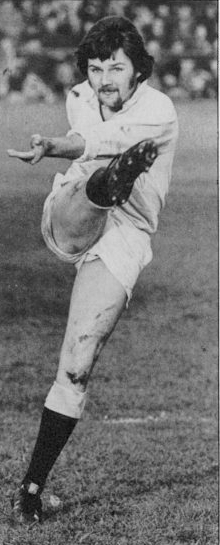
Two days after this, Camborne were pretty much back to full strength. That season’s John Player Knockout Champions, Gloucester, were visiting the Rec.
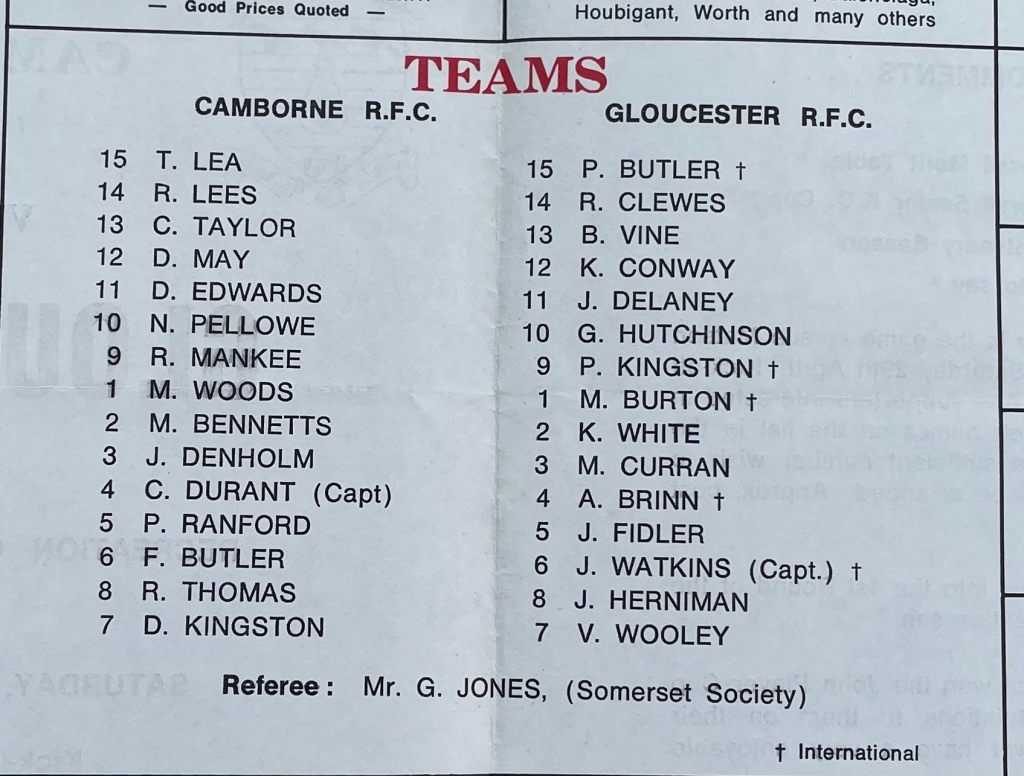
Gloucester fielded five internationals – Peter ‘The Boot’ Butler, Peter Kingston, Alan Brinn, Mike Burton, John Watkins – and won 3-16.
It was Butler’s play that proved Town’s undoing, as he took the full house of try, conversion, penalty and drop-goal in the victory.
‘The Boot’ remembers all Cornish opposition as “tough and abrasive”, and singles out Nigel Pellowe as a worthy example.
In the bar, a few Town players spoke to Mike Burton about Matson. They were curious to know something of the side they would visit in a week’s time.
Malcolm Bennetts said that Burton’s face
…was a picture…good luck with that one [said Burton]…they’re nutters…our second team refuse to play them…
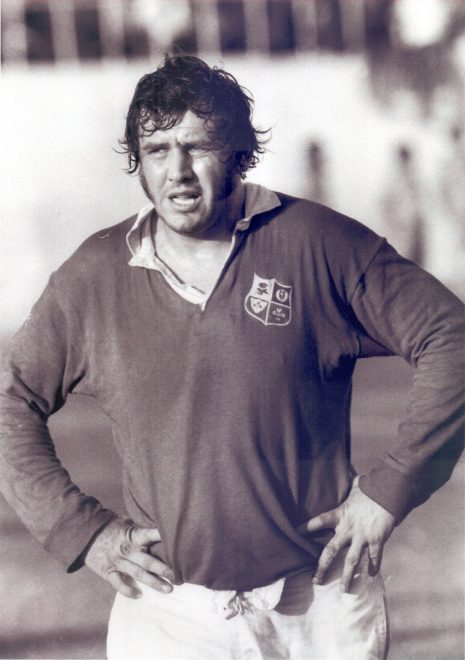
David Kingston, himself an ex-Gloucester player, remembers being told similar.
Bennetts reckons Burton’s statement was one “we should have taken notice of”, but on the other hand, Benny thought,
…we cannot get any harder matches than we’ve already played…
Dave Edwards and David May echo this. Town
…didn’t do their homework…
on Matson.
Big bastards…
On Monday 24th, Camborne played South Wales Police, and lost 0-18.
Playing for Town, in one of his first appearances for the Chiefs, was full-back Kevin Lean. “Big bastards” was his term for the rangy opposition.
They were “huge”, said Malcolm Bennetts, and they were good.
At a lineout on the Home 25, the opposition’s 8 gathered the ball and clattered Chris Durant – yes, Chris Durant – to the ground. He then, recalls Bennetts, “stormed over” Mankee, and charged,
…knees up to his chest…flat-out…straight at the last man standing…
who was Kevin Lean. This 6ft, 16 stone bull obviously wasn’t about to attempt a sidestep.
Ten yards from Lean, and Kevin suddenly stood to one side, guiding the Policeman through, like a copper directing traffic.
Bemusement quickly gave way to hilarity. Durant, trying hard to keep a straight face, asked of Lean just why he had done that. Well, said Lean,
…if eight forwards and a scrum-half can’t stop him, how the hell am I?
All joking aside, Kevin Lean had
…the heart of a lion…
reckoned Bennetts.
*
Two days before the trip to Matson, Camborne were due to play Tredegar. For once, Town talked their visitors out of making the fixture. That really would have been a game too many.
Furthermore, the day of the Matson game had originally been that of the Centenary Season’s grand finale: a showpiece clash with arch-rivals Redruth. The Reds cancelled without too much fuss. They couldn’t upset the party now.
…a story in itself…
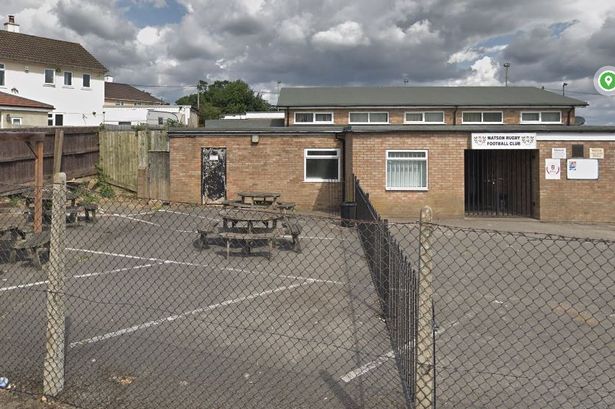
If Camborne had done their homework, they would have known that Matson were certainly no pushovers.
The club had booked their slot in the John Player competition that season by winning the Gloucester Combination Cup. In 1977-78, they had only lost one game, conceded only two tries, and scored 944 points4.
Matson held a “junior” station in Gloucestershire5, but the team had little or no regard for status or reputation.
Camborne took a coach-full of players, clubmen and fans up to Gloucester, leaving South Terrace at 4pm on the Friday. Two players didn’t make the trip: Nigel Pellowe was still recovering from a shoulder injury, and Steve Floyd was preferred at 10 to Derick Taylor, a decision, Taylor told me, that
…f__king pissed me right off…
(To this day, whenever Taylor bumps into Steve Floyd, he always remembers to enquire of Floyd whether he enjoyed his trip.)
They only arrived at their hotel in the early hours of Saturday morning.
En route, the bus broke down, and the whole party had to wait for a replacement charabanc. Once in Gloucester, and desperately searching for their digs, the driver was booked and fined for driving the wrong way down a one-way street.
You couldn’t make it up, and I’m not: Malcolm Bennetts recalls the trip vividly.
He also recalls him and his room-mate, travelling reserve Mike ‘Delme’ Thomas, being woken up at around 7am by workmen digging up the road outside. As preparations for a big game go, Camborne’s could have been better.
They were about to learn all about Matson. To complete the quotation from Steve Floyd with which I opened this post:
Matson. What a game, for all the wrong reasons…
Likewise Malcolm Bennetts:
…it put shivers down my spine just mentioning that name…
The trip, stay, and the match itself certainly have all the qualities of
…a story in itself…
David May
…tactical thuggery…
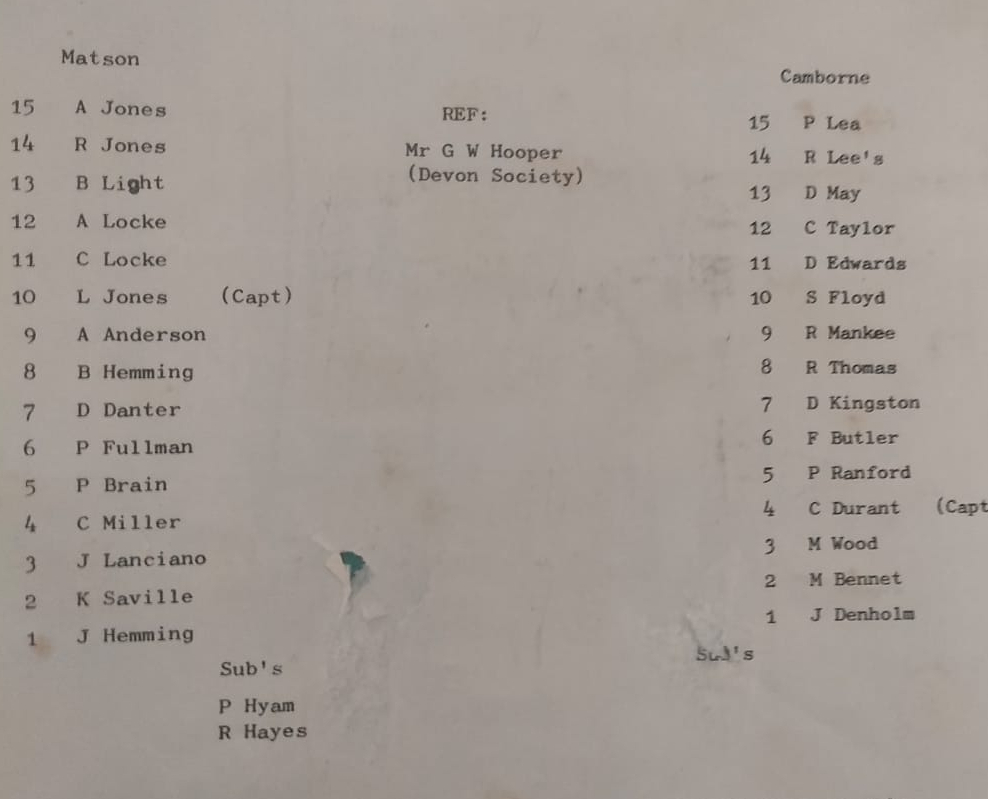
Even the drive to the pitch, through Matson itself, a post-war inner-city estate, gave a sense of foreboding. Malcolm Bennetts remembers that
…people stopped and stared…very intimidating…
The changing rooms in the Matson clubhouse were in fact one large room, divided by a curtain.
Matson players – and supporters – regularly wandered through this flimsy divide on their way to the bar, bathroom, or to simply to size up the opposition. If this was a deliberate ploy to put the visitors off their stride, it wasn’t without success. Bennetts said that
…we didn’t seem to have any time for a warm-up or a private talk…
In contrast, Matson’s Vice President (and left wing that day), Clive Locke, told me that
Camborne only turned up an hour before kick-off which we thought was a bit late…they seemed very relaxed…
From the kick-off, Matson’s approach of what Dave Edwards terms “tactical thuggery” came to the fore:
…late tackles, punches thrown at lineouts and scrums…
As Paul Ranford admits, Camborne were of course “no angels” in this regard, but
Matson took it to another level…
Steve Floyd
Matters deteriorated rapidly at the first lineout. A large crowd had gathered to generally hurl insults at Camborne’s players, which was “nothing unusual”, said Bennetts, but here they stood a bare metre from the touchline, with only a piece of binder-twine keeping them honest.
Bennetts had the ball heaved at him by the spectators, who followed this up with threats screamed in his face. As he turned to throw, one fan jabbed him in the ribs.
Matson won the ball and hoofed it downfield, but play was forgotten. Both sets of forwards started a mass brawl on the pitch, Matson’s ranks being bolstered by several over-zealous spectators.
Richard Thomas, said Chris Durant, was “laid out” almost immediately (“the most intimidating place I’ve ever been”, said Thomas later). Matson’s entire front row then turned its attention to Malcolm Bennetts. Fortunately for Benny, Jock Denholm and Mike ‘Slinger’ Woods were on hand, with them both
…coming in horizontally…boots and fists flying…taking on the whole pack and loving it…and me thinking I’ve got a wife and two kids, I want to get home tonight in one piece…
Malcolm Bennetts
(Bob Lees recalls another instance where it looked as if Jock was being “pummelled to death”.)
Order, or some vague semblance of it, was eventually restored by the referee who otherwise
…just let the wanton violence happen…
Steve Floyd
“Weak” is the verdict of many Camborne players on the match official.
And so it continued. Dave Edwards tackled a player into touch and was set upon by a mob brandishing umbrellas.
Chris Durant described the match as “hellup”, and threatened to lead his men off the pitch.
David May told me that
…there were punches thrown after every lineout…
Matson’s no. 8, Hemming (described as “an absolute maniac” by David Kingston) was tackled at one point by Bob Lees. Lees remembers Hemming
…headbutting me on the way down…
Hemming also targeted Robert Mankee. Mank informed me that this
…didn’t worry me, [but they] booted the shit out of me…[a] bunch of f__king heathens [that] frightened a lot of people…
Edwards recalls having to “help” Mankee with Hemming at least once.
David Kingston went off injured. Tanzi Lea popped a shoulder and had to go to hospital.
Even though Town had brought two reserves for the game, they still finished the match with thirteen men.
…a defeat for Cornish Rugby…
Camborne lost, 22-3. Matson ran in three second-half tries. “We outplayed them”, said their 9, Alex Anderson.
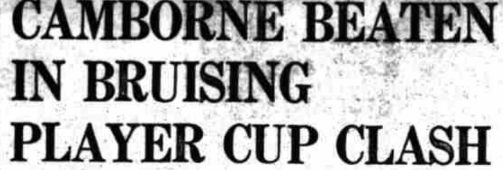
The Packet described the loss as a “defeat for Cornish Rugby”:
Unless Cornish teams play stronger opposition on a regular basis…the Cornish game will suffer.
Packet, May 5, 1978. Courtesy Frank Butler
What is perhaps being suggested here is the need for an official, national league structure. But that wasn’t to happen for another ten years.
Yes, Camborne lost. Worse, they’d been beaten. “The only time ever”, David May remarked.
Dave Edwards recalls that Matson
…were up for it, and we weren’t…a sad end to the season…
May puts it best:
Make no mistake, Matson could play rugby and would have beaten us without the fighting…
There was one small comfort, however: a Cup tradition that both sides could share the gate money. Frank Butler recalls that, in short order, a Matson committee man upended a bucket of notes and shrapnel onto a bar table and swept half of it towards Camborne’s end:
…we didn’t stop to count it…
It’s how things are done in Matson.
…what goes on the pitch…
Matson proceeded to the last 16 of the John Player Cup, where they lost to Richmond. This match gave them a brief tabloid notoriety after they left three Richmond players needing stitches, one concussed, and their supporters allegedly ran amok in the Richmond clubhouse, ripping photos off the walls and stealing trophies.
The Richmond players, though, had apparently little issue with Matson, no matter how much their club condemned them6.
It boils down to one of rugby’s unwritten rules:
…what goes on the pitch…stays on the pitch…
Malcolm Bennetts
And that may have been the end of it, had not a Camborne committee member been quoted in the Press that, with hindsight, Camborne ought to have played Matson at the beginning of the 78-79 season, not the end of the 77-78 edition.
Furthermore, the fixture should have been played on a ground other than Matson’s own,
…where facilities worthy of a senior club would have been provided…
West Briton, June 29, 1978, p20
If that wasn’t inflammatory enough,
Matson were not worthy opponents for Camborne…
West Briton, June 29, 1978, p20
To this day, these comments still rankle with the Matson players. “Sour grapes”, is how Clive Locke dismisses them.
…a game too far..?
Was this a game too many for Camborne?
Several players and clubmen have stated yes, perhaps so. But this is with hindsight – had Camborne beaten Matson, no problem.
Both Durant and Mankee agree that playing the game at the end of the season was the correct decision; after all, at the time, all the players agreed on this.
David Kingston, in fact, wanted a rematch:
…let’s have the f__kers down here…
To which Chris Durant is supposed to have replied,
…over my dead f__king body…
At time of writing, there’s still to be a rematch. As we all know, few people argue with Chris Durant…
Chris…
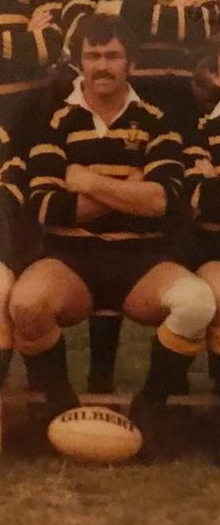
Chris didn’t really want to skipper Camborne in 1977. The players, led by David Kingston, pushed his name forward, and you get the impression that, if they hadn’t twisted his arm, he would have contentedly spent the season winning lineouts and issuing the odd backhander.
No, captaincy wasn’t a thing he was “hankering” after. Indeed, Chris said that he
…didn’t enjoy at all at first…a lot of bleddy pressure…
He may have been a reluctant leader, but the qualities that make a good captain were already present. First, man-management. Chris quickly realised he
…had to talk to each individual differently…
What motivates one will discourage another. Second, you had to set an ideal for the team. Durant would never ask of his men
…anything I wouldn’t do myself…
This attitude rapidly meant others looked up to him, and he became less a skipper and more a figurehead. From this comes presence. For Robert Mankee, just his
…being in the dressing room was enough to put your body on the line…he could bring out the best in the team…
He had more playing experience than many of his young squad, too, and put his knowledge to good use: the team’s “thinker”, is how Terry Symons recalls him.
His team talks, Mankee remembers, were always quiet, brief, and to the point: everyone knew who to watch, everyone knew their job.
For Paul Ranford, Durant was the key factor behind Camborne’s
…style of rugby and the drive to be successful that season…
Allied to his leadership, which Jumbo Reed described as “fearless”, was his key role in the lineouts with Paul Ranford. Durant was “untouchable” at the front of the line, said Reed, and the partnership of him and Ranford in the second row remains highly rated in Cornish rugby circles.
He could also kick goals, and scored over 180 points that season, thanks mainly to that sledgehammer right boot.
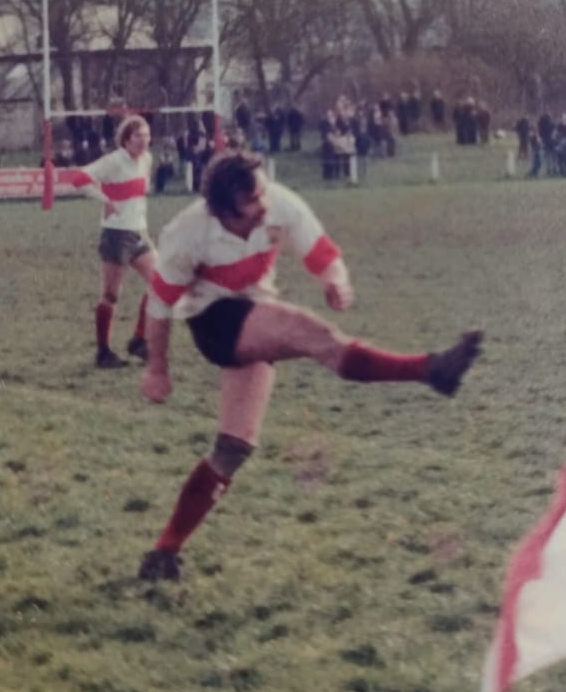
However, like the captaincy, Chris was a reluctant kicker. He
…didn’t want to be kicking…only if [the regular kickers] didn’t come off, I would take over…I had enough work to do…
But he knew his men looked up to him. He knew he couldn’t shirk a job, and if him doing that job was probably the difference between winning and losing, so be it: witness the CRFU Cup Final7.
“We never questioned following Chris”, said David May. You wouldn’t argue, or pick a fight with him either.
Some talk of the exploits of Ranford and Tonkin, or Denholm, Pellowe, or Mankee. But Chris was in a league of his own. “If he hit you”, said Paul Ranford, “it was curtains”.
Frank Butler reckons he had the “hardest back-hand” in rugby, and knows that, to this day, Bill Beaumont, England Grand Slam winner and Chairman of the RFU, still tells the story of how Chris Durant hit him so hard he threw up over his boots.
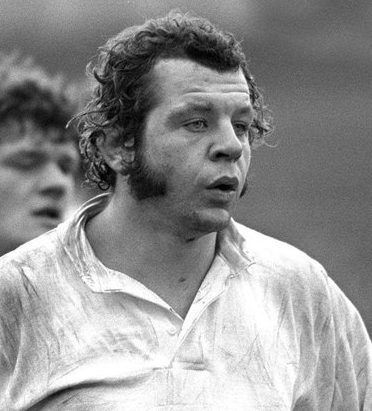
David May reckons he
…could be brutal…but he never got caught…
In contrast to Paul Ranford, whose retaliations would be more immediate, Durant would bide his time. Then there would be a ruck, or a maul…and as the players jogged from the scene, Durant’s victim would be left prostrate.
Nobody had seen it happen. But everybody knew.
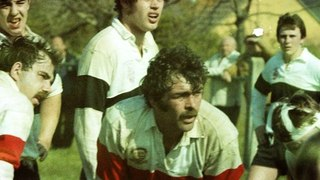
You might say that the Centenary Season was the making of Chris Durant as a rugby player. Alan Truscott, a man who knows him very well, certainly thinks so:
Chris led by example on the field. He had the total respect of the players and committee…[later], his reputation in Cornwall and beyond was immense. Rugby is a team game, you win as a team and lose as a team, but the one player who led us during the Centenary was, without doubt, Chris Durant.
They could not have done it without him.
Some bleddy boys…
P: 51, W: 38, D: 2, L: 11. F: 996, A: 440.
The Centenary Season was also the making of Camborne RFC.
Winning the CRFU Merit Table gave them access to regular upcountry opposition in the South West Merit Table. Here they could rely on what Paul Ranford calls “fast, physical” and challenging rugby against the best in the region8. In 1978-79, for example, Town had “bruising” encounters with Bath, Bristol, Exeter, Gloucester, and Plymouth Albion9.
This near-constant exposure to a higher level of play fed back into Camborne’s own game, and in Cornwall their exploits were formidable. Town became the standard-bearers of Cornish rugby in the South West.
Allied to this was the conveyor-belt of talent initiated by David May and Frank Butler that season: the founding of a mini/junior section at the club.
Youngsters were coached by the best in Cornwall, could regularly watch the best in Cornwall, and could learn the game in an atmosphere of confidence and success.
Between the 1977-78 Centenary Season, and the first season of a national league structure in 1987-88 (the CRFU Merit Table was then disbanded), Camborne were league champions seven times.
During the same period, they also won the CRFU Cup in 1977-78 (of course), again in 1984-5, and also in 1986-7. They were also runners-up in five other seasons. Not bad for a side who reckoned they were never a great Cup team.
Camborne were the highest placed Cornish club for the first season of the national leagues in 1987-88. They remained in the fourth tier of English rugby until 1993, and had also progressed – briefly – to the third tier10.
But it was the Centenary Season that started this golden run for Camborne, and has since become the stuff of legend, its players figures of adulation.
Mike Symons and Paul White recall, as youngsters, the pride they felt at being given the task of hanging the Town XV’s jerseys on their pegs in the changing-room.
Another lad of the time simply states that they were
…my heroes…
Mike Richards says they were
…an example for all us younger players at the time to try to follow…
Ian Pollard:
Legends…
Treve Blake: a
…great team…
But I think the last word must go to a lady called Ju Richards.
The Centenary Team were
…some bleddy boys…
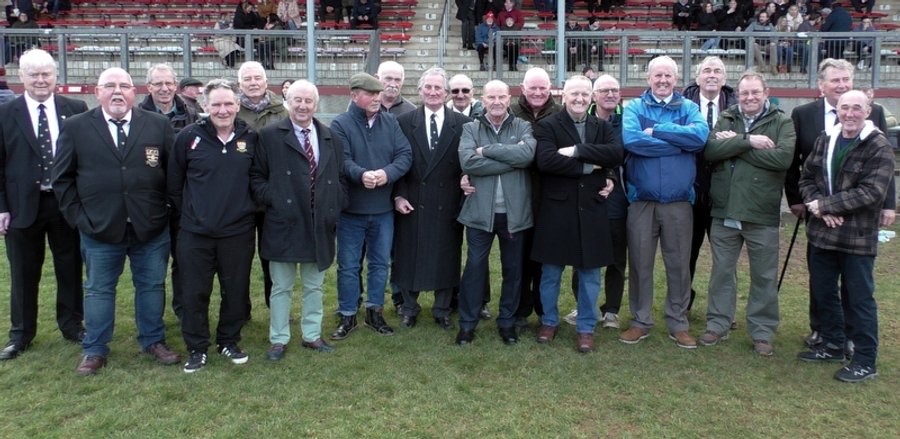
Many, many thanks to all who have contributed. Writing about Rugby is as much a team game as playing it.
References
- Packet, April 26, 1978.
- West Briton, April 24, 1978, p20.
- See Rugby Special ~ Part Twelve here.
- See: https://www.pitchero.com/clubs/matson/a/history-9101.html
- West Briton, May 4, 1978, p20.
- Daily Mirror, February 26, 1979, p27 & 30.
- See Rugby Special ~ Part Twelve here.
- Of course, there was no recognised national league structure at this time; hence the proliferation of leagues going under the guise of ‘Tables’ or ‘Alliances’, as in the Anglo-Welsh Alliance discussed in Part Eleven here. A ‘league’ was held to smack of professionalism and as such was frowned upon by the RFU. Indeed, the South West Merit Table wasn’t even recognised by the RFU and was criticised for being “unofficial” (Torbay Express, December 8, 1978, p6), and “of little interest” (Wells Journal, August 2, 1979, p10). Try telling that to the players involved.
- West Briton, October 5, 1978, p16.
- See: https://en.wikipedia.org/wiki/Camborne_RFC
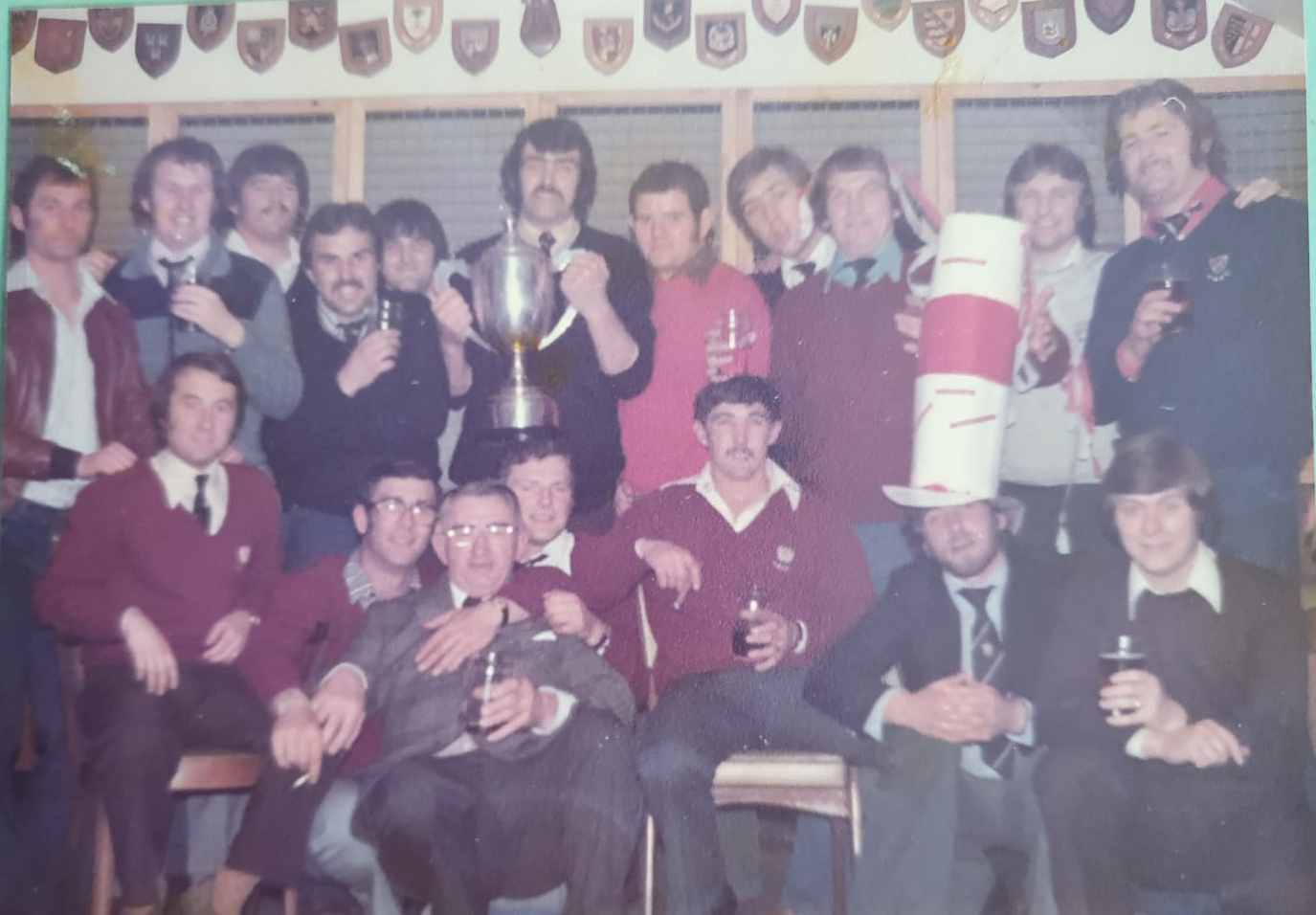
It’s been a fantastic read Francis and it was a honour to have been their yesterday. Unfortunately we didn’t get a chance to talk but it was wonderful to cath up with so many friend’s. Really enjoyed yesterday.
LikeLike
Thank you once again Fran. Great that you were able to be at the Club on Saturday when many of these players came together to celebrate and relive these memories. Absolutely brilliant!
LikeLike
Thanks mate – really appreciated all you did yesterday. Fantastic
LikeLike
Well done Francis well written a fascinating read and brought back some great memories and was great to meat up at the club on Saturday.Lovely to catch up with some past players and to watch the present town side win with style.Thanks again Francis
LikeLike
Great to see you too Benny
LikeLike
Excellent Series Francis; Susan want’s you to put the centenary season into a book. It was great to see all the guys yesterday and see Camborne 1st, playing such great running rugby; the whole Camborne set-up is great. Thanks again Francis.
LikeLike
Great to see you as well Bob – glad you enjoyed the day
LikeLike
Thanks for a great get together Saturday at the club house great to see all the great players 😁😁
LikeLike
Good to hear pard – and great to see you! Take it steady
LikeLike
Great series Francis. Very well put together. Congrats to those on the Camborne RFC committee for the reunion last Saturday, the very high standard of entertaining rugby and the friendly feel in the clubhouse. A very special club.
LikeLike
Many thanks Steve, much appreciated. Was great to meet you on Saturday, and yes, it was a very memorable day.
LikeLike